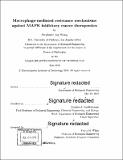| dc.contributor.advisor | Douglas A. Lauffenburger. | en_US |
| dc.contributor.author | Wang, Stephanie Joy. | en_US |
| dc.contributor.other | Massachusetts Institute of Technology. Department of Biological Engineering. | en_US |
| dc.date.accessioned | 2019-11-22T00:09:37Z | |
| dc.date.available | 2019-11-22T00:09:37Z | |
| dc.date.copyright | 2019 | en_US |
| dc.date.issued | 2019 | en_US |
| dc.identifier.uri | https://hdl.handle.net/1721.1/123068 | |
| dc.description | Thesis: Ph. D., Massachusetts Institute of Technology, Department of Biological Engineering, 2019 | en_US |
| dc.description | Cataloged from PDF version of thesis. | en_US |
| dc.description | Includes bibliographical references (pages 93-108). | en_US |
| dc.description.abstract | Kinase inhibitors targeting the MAPK pathway are often limited by lack of durable clinical responses or, in many cancer types, lack of even initial responses. While great headway has been made on characterizing mechanisms of resistance, understanding the full influence of complex intercellular interactions on drug resistance remains a challenge. Here, we combine computation with experiment to investigate the cellular and molecular contributions of the tumor microenvironment to MAPK inhibitor response. First, we employ a computational framework using published bulk and single-cell patient gene expression data to investigate immune cell correlates of MAPK inhibitor resistance, and subsequently quantify potential intercellular ligand-receptor interactions between cell populations of interest. Next, we use multiplex proteomic immunoassays and co-culture experiments to characterize the impact of these interactions on tumor-intrinsic bypass signaling and phenotype. To assess the in vivo relevance of these multicellular and multidirectional signaling networks, we develop an intravital imaging strategy to monitor the influence of tumor-associated macrophages on cancer cell kinase activity dynamics. Finally, we rationally design a nanotherapy to exploit inhibitor-induced immunomodulation and crosstalk. Overall, we present a paradigm to systematically dissect signaling pathways between tumors and their microenvironments, validate these interactions in various models of disease, and design therapeutic strategies to target them. | en_US |
| dc.description.statementofresponsibility | by Stephanie Joy Wang. | en_US |
| dc.format.extent | 108 pages | en_US |
| dc.language.iso | eng | en_US |
| dc.publisher | Massachusetts Institute of Technology | en_US |
| dc.rights | MIT theses are protected by copyright. They may be viewed, downloaded, or printed from this source but further reproduction or distribution in any format is prohibited without written permission. | en_US |
| dc.rights.uri | http://dspace.mit.edu/handle/1721.1/7582 | en_US |
| dc.subject | Biological Engineering. | en_US |
| dc.title | Macrophage-mediated resistance mechanisms against MAPK inhibitory by cancer therapeutics | en_US |
| dc.type | Thesis | en_US |
| dc.description.degree | Ph. D. | en_US |
| dc.contributor.department | Massachusetts Institute of Technology. Department of Biological Engineering | en_US |
| dc.identifier.oclc | 1127385355 | en_US |
| dc.description.collection | Ph.D. Massachusetts Institute of Technology, Department of Biological Engineering | en_US |
| dspace.imported | 2019-11-22T00:09:36Z | en_US |
| mit.thesis.degree | Doctoral | en_US |
| mit.thesis.department | BioEng | en_US |
